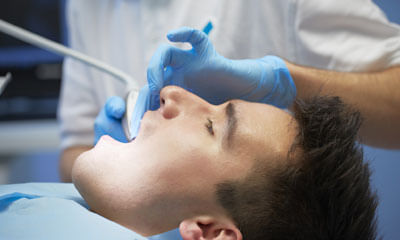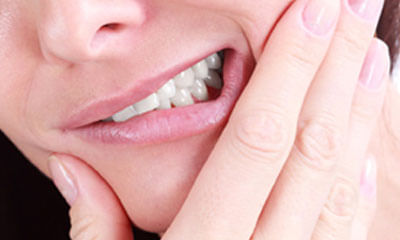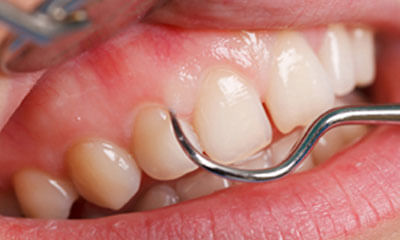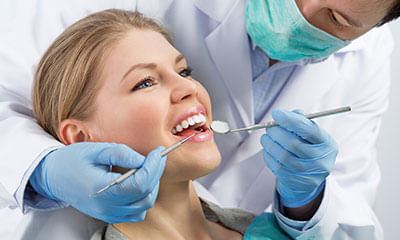How To Reduce Gum Swelling
My wisdom tooth is growing from side, sometimes it causes pain. Should I go for surgery or any other alternatives are ne ...
Ask Free Question
Whether you should get surgery for your sideways-growing wisdom tooth depends on several factors, and determining the best course of action requires professional guidance. However, I can provide some information to help you understand your options: reasons for surgery: pain: if your wisdom tooth is causing you pain, especially recurring or severe pain, surgery to remove it is often the recommended course of action. Wisdom teeth growing sideways can irritate gum tissue and surrounding teeth, leading to discomfort. Infection: sideways-growing wisdom teeth are more prone to infection due to difficulty cleaning them properly. Infections can cause significant pain, swelling, and other complications, necessitating surgery. Damage to other teeth: sideways-growing wisdom teeth can push against neighboring teeth, causing crowding, misalignment, and even damage. Removing them can prevent these issues. Cyst formation: in some cases, sideways-growing wisdom teeth can lead to the formation of cysts, which are fluid-filled sacs that can damage the jawbone and surrounding teeth. Cysts typically require surgical removal. Alternatives to surgery: monitoring: if your wisdom tooth isn't causing any problems and isn't at high risk of causing issues in the future, your dentist may recommend monitoring it regularly. Pain management: while not a long-term solution, over-the-counter pain relievers and anti-inflammatory medications can help manage pain associated with an erupting wisdom tooth. Gum irrigation: proper oral hygiene and regular use of a water flosser can help keep the area around your wisdom tooth clean and reduce the risk of infection. Next steps: the best way to determine whether surgery is necessary for your situation is to consult a dentist or oral surgeon. They can assess your wisdom tooth through x-rays and a physical examination to understand its position, potential risks, and the most appropriate course of action. Remember, seeking professional advice is crucial for ensuring proper dental health and preventing potential complications.
Anyone can help me. My tongue swollen and painful. Lots of taste buds swollen there. My jaw is hurting at the end of the ...
Ask Free Question
I understand you're experiencing discomfort and pain in your mouth and jaw, and I want to help provide some guidance. However, I cannot diagnose medical conditions or offer specific medical advice. It's important to seek professional medical help for accurate diagnosis and proper treatment. With that in mind, here are some general suggestions: seek medical attention: contact your dentist immediately: explain your symptoms and schedule an appointment as soon as possible. They can examine your mouth, diagnose the cause of your pain and swelling, and recommend the appropriate treatment. Consider emergency care if: you have difficulty breathing or swallowing. You have severe facial swelling or redness. You have a high fever. You experience intense, unrelieved pain. Possible causes: swollen taste buds: several factors can cause this, including allergies, irritation from dental appliances, oral thrush, or burning your tongue. Wisdom tooth issues: painful gum inflammation and swelling around wisdom teeth are common, especially if they're impacted or erupting. Tips to manage discomfort: gargle with warm salt water several times a day to soothe pain and swelling. Apply a cold compress to your cheek to reduce swelling and pain. Over-the-counter pain relievers like ibuprofen or acetaminophen can help manage mild pain. Avoid spicy, acidic, or hot foods that may irritate your tongue and mouth. Maintain good oral hygiene: brush and floss gently around the affected area to prevent further infection. Remember: don't try to diagnose yourself or ignore the symptoms. Seek professional medical advice to get a proper diagnosis and treatment plan. Follow the dentist's instructions carefully to ensure proper healing. I hope this information provides some initial guidance and helps you find the right medical care. Wishing you a speedy recovery!
I have a wisdom tooth and it is paining too much from last few days. I'm 20 years old. It is also seems a little lose an ...
Ask Free Question
I understand that you're experiencing pain and sensitivity in your wisdom tooth, and that it's been going on for several days. This can be quite distressing, and I can offer some general information and suggestions, but I cannot provide medical advice or diagnose your condition. Wisdom teeth often cause problems as they erupt: pain and swelling are common symptoms, especially as the tooth pushes through the gum tissue. The tooth may feel loose or sensitive due to inflammation and pressure in the area. Other symptoms can include bad breath, difficulty chewing, and jaw tightness. Here are some things you can do to manage the pain and discomfort: over-the-counter pain relievers: medications like ibuprofen or acetaminophen can help alleviate pain and inflammation. Follow the dosage instructions carefully and consult your doctor if you have any medical conditions or are taking other medications. Cold compress: apply a cold compress to the outside of your cheek near the affected tooth for 10-15 minutes at a time. This can help reduce swelling and discomfort. Warm salt water rinses: mix a teaspoon of salt into a glass of warm water and rinse your mouth gently several times a day. This can help clean the area and reduce inflammation. Practice good oral hygiene: brush and floss your teeth regularly, including the area around the wisdom tooth. This can help prevent infection and further irritation. Important note: it's crucial to see a dentist as soon as possible. They can properly diagnose the situation, assess the position and health of your wisdom tooth, and recommend the best course of treatment. Depending on the specific situation, treatment options may include: monitoring the tooth's eruption if it's not causing significant problems. Prescribing antibiotics if there's an infection. Performing a surgical procedure to remove the wisdom tooth, especially if it's impacted (stuck) or causing extensive pain and complications. Remember, ignoring a painful wisdom tooth can lead to serious complications like infection, damage to surrounding teeth, and jawbone problems. Therefore, seeking professional dental help promptly is essential for addressing the issue and protecting your oral health. I hope this information is helpful! please prioritize seeing a dentist to get proper diagnosis and treatment for your wisdom tooth.
I have pericoronitis and my impacted wisdom tooth has only partially erupted (gum flap up top. My dentist reduced the he ...
Ask Free Question
While I understand your desire to avoid medication if possible, I strongly advise against skipping the medications your dentist prescribed for your pericoronitis and partially erupted wisdom tooth. Here's why: importance of medication: infection prevention: pericoronitis is an inflammation of the gum tissue surrounding a partially erupted tooth, making it prone to infection. Antibiotics like augmentin 625 help prevent and control bacterial infections. Inflammation reduction: zero dol contains ibuprofen, which effectively reduces inflammation and pain associated with pericoronitis. Gum healing: orahelp gel contains hyaluronan, which promotes tissue healing and soothes the inflamed gum flap. Oral hygiene: hydroxyl peroxide betadine mouthwash helps control bacteria and maintain oral hygiene, crucial for preventing further infection. Consequences of skipping medication: worsening of infection: skipping antibiotics can lead to a worsening infection, causing more pain, swelling, and potentially requiring stronger medication or even surgical intervention. Prolonged pain and discomfort: ibuprofen helps manage the pain associated with pericoronitis, allowing you to function more comfortably during the healing process. Delayed healing: skipping orahelp gel may prolong the healing of the inflamed gum flap. Considering your situation: early stage: if your pericoronitis is mild and you haven't experienced significant pain or swelling, it's tempting to think the medication isn't necessary. However, even mild cases can progress quickly, making prevention crucial. Partial eruption: the gum flap covering part of your wisdom tooth creates a pocket vulnerable to food debris and bacteria, increasing infection risk. Medication plays a key role in protecting against this. Dentist's advice: your dentist has assessed your specific situation and prescribed the medication based on their professional judgment. Trusting their expertise is vital for optimal healing. Remember: the side effects of these medications are generally mild and manageable, especially given the short duration of the prescribed course. Avoiding medication may lead to longer-term discomfort and potentially more invasive interventions in the future. Alternatives to consider: discuss over-the-counter pain relievers (like paracetamol) if ibuprofen doesn't agree with you. Explore alternative topical solutions for gum healing if you have concerns about orahelp gel. Ultimately, the decision of whether or not to take the medication is yours. However, I strongly recommend following your dentist's advice and completing the prescribed course for optimal healing and infection prevention. I hope this information helps you make an informed decision regarding your medication. Feel free to ask if you have any further questions.
I feel slight pain under left jawline only when I touch it, upon tilting my head backwards I could feel something swolle ...
Ask Free Question
I understand your concern about the swollen and painful area under your left jawline. While I can't provide a definitive diagnosis without a physical examination, I can offer some information and advice that may help: swollen lymph nodes: it's likely that the lump under your jaw is a swollen lymph node. Lymph nodes are part of your immune system and can swell in response to various causes, including infections, allergies, and sometimes, more serious conditions. Swollen lymph nodes due to common infections like the cold or flu usually resolve on their own within a few weeks. However, if the swelling persists for more than two weeks, grows rapidly, becomes hard and fixed, or is accompanied by other concerning symptoms like fever, night sweats, or unexplained weight loss, it's crucial to see a doctor for further evaluation. Gum pain: the pain in your gums while brushing on the lower left jaw could be related to the swollen lymph node, possibly due to inflammation in the surrounding tissues. It could also be a sign of gum disease, a cavity, or another dental issue. If the gum pain persists or worsens, it's essential to schedule an appointment with your dentist for a checkup. Life-threatening: while it's always good to be cautious, it's unlikely that your swollen lymph node is life-threatening, especially given that you haven't experienced any other significant symptoms. Recommendations: monitor the swelling: observe if the lump grows or changes in texture, and take note of any new symptoms like fever, night sweats, or difficulty swallowing. Warm compress: apply a warm compress to the area for 15-20 minutes several times a day to help reduce inflammation and discomfort. Practice good oral hygiene: maintain proper oral hygiene by brushing your teeth twice daily and flossing regularly. This can help reduce gum inflammation and prevent potential dental issues. See a doctor: if the swelling doesn't improve within a few weeks, grows rapidly, becomes hard and fixed, or is accompanied by other concerning symptoms, consult your doctor for a proper diagnosis and appropriate treatment. See a dentist: schedule an appointment with your dentist to assess the gum pain and rule out any dental issues. Remember, I am not a medical professional and this information should not be taken as a substitute for professional medical advice. It's important to seek proper medical attention for accurate diagnosis and treatment. I hope this information is helpful and puts your mind at ease. Please feel free to ask any further questions you may have.
I am 21 years old studying pg at jalandhar not able to chew food properly as my wisdom teeth below swelling occurred pas ...
Ask Free Question
I understand your discomfort with your swollen wisdom teeth preventing you from chewing properly. Here are some suggestions on precautions and medications that might help until you can see a dentist: precautions: avoid hot and cold food: opt for lukewarm or room-temperature foods that are soft and easy to swallow. Examples include mashed potatoes, soups, yogurt, smoothies, and scrambled eggs. Cut your food into small pieces: make chewing easier by cutting your food into bite-sized pieces or even mashing them further. Maintain good oral hygiene: brush your teeth twice a day, floss once a day, and consider using a mouthwash. This will help keep the area clean and prevent further infection. Apply a cold compress: place a cold compress (wrapped in a towel) on your cheek next to the swollen area for 15-20 minutes at a time, several times a day. This can help reduce swelling and pain. Avoid strenuous activity: strenuous activities can increase blood flow and worsen swelling. Stick to light activities and get plenty of rest. Medications (over-the-counter): pain relievers: over-the-counter pain relievers like ibuprofen or acetaminophen can help manage discomfort. Follow the dosage instructions carefully and do not exceed the recommended daily intake. Anti-inflammatory medications: ibuprofen is also an anti-inflammatory medication that can help reduce swelling. Consider using it in addition to a pain reliever for added relief. It's important to see a dentist as soon as possible: a dentist can properly diagnose the cause of the swelling and determine the best course of treatment. They might prescribe antibiotics if an infection is present. Depending on the severity of the situation, they might recommend removing the wisdom teeth, especially if they are causing persistent pain or impacting your quality of life. Additional tips: rinse your mouth with salt water: mix a teaspoon of salt with warm water and gently rinse your mouth several times a day. This can help reduce inflammation and keep the area clean. Avoid smoking and alcohol: smoking and alcohol can irritate the gum tissue and worsen swelling. Stay hydrated: drinking plenty of water helps keep your mouth moist and can aid in the healing process. Remember, these are just suggestions, and it's crucial to prioritize professional medical advice. Seeing a dentist will provide the most accurate diagnosis and treatment plan for your specific situation. I hope this information helps you manage your discomfort until you can visit a dentist. Please get well soon!
I am getting nausea and unsteadiness, whole back pain sometimes, mostly lower back pain. Whenever I eat or drink I feel ...
Ask Free Question
U have to improve your food habits do 1. Take 2/ 3glass of warm water in the morning before brush 2. Take more water in day 3. Take meals at fixed hrs, chew food properly/ completely, no eating quickly 4. Take small amount of food at a time, take more frequent meals - may be five times a day. 5. No spicy/ fried/ fast/ junk/processed food. Caffeine, 6. No smoking, chewing gum, and carbonated beverages. 6. No milk for few days, can take curd, no uncooked salad 7. Avoid constipation 8. Use nibupani (lemon water) 2/ 3 times a day 9. Do not drink/ store water in plastic bottles. 10 .relax and walk for 30 mts daily 11. Take enough rest- do not lie down immediately after eating. Take dinner 3 hrs before sleeping. No late nights 11. Keep your weight under control. 13. Avoid tea, coffee, alcohol 15. Reduce physical and mental stress. Maintain healthy life style. Do exercise regularly. 16. No unnecessary medicines medicine can not be advised for open question for medicine and further advise contact on private consultation good luck.
I had sensitivity in teeth 3-4 months ago but I didn't pay any special attention to it. But since a week I have tender a ...
Ask Free Question
You take oilpulling n scaling if you need any details contact me also take antibiotics n vitamin supplements avoid spicy n sweet foods.
I am 40 and I eat spicy junk food now my stomach is hurting and I feel some swelling within it. I have no appetite to ea ...
Ask Free Question
What r other symptoms that you r experiencing? By doing what like walking, exertion, eating or empty stomach- it increases or decreases in intensity. For how much time the pain remains? Is there stiffness also? How is your appetite? R you constipated? Any problem in urine? I need to know more to be able to make diagnosis. In the meanwhile follow this 1. Don't take tea empty stomach. Eat something like a banana (if you are not diabetic) or any seasonal fruit or soaked almonds and a glass of water first thing in the morning (within 10 mins of waking up). No only biscuits or rusk will not do. 2. Don't overeat 3. Take your breakfast every day. Don't skip it. U should eat whatever your mother or grandparent eat in bfast. I mean to say whatever is your traditional food. If punjabi eat paratha, if belongs to south then take idli/ dosa etc. 4. Have light meals every 2 hours (in addition to your breakfast, lunch n dinner) e.g. Nariyal paani, chaach, a handful of dry fruits, a handful of peanuts, any fresh n seasonal fruit, a cup of curd/milk etc 5. Finish your dinner at least 2 hours before going to sleep. 6. Maintain active life style7. Avoid fast foods, spicy n fried foods, carbonated beverages 8. Take a lot of green vegetables n fruit. 9. Drink lot of water.10. Everyday preferably sleep on same time exercise in the form of yoga, cycling, swimming, gym etc. Till lockdown do suryanamaskar every day. for this homeopathy offers good results. Consult online with details.
Sir/mam I am suffering from gingivitis I think. But I am not sure but symptoms is almost same like swelling gums and red ...
Ask Free Question
hello lybrate user... the gingivitis mostly associated with, swelling gums, bad breath, redness, and plaque accumulation.. I advice you to do scaling.. then gingival inflammation, bad breath will reduce and also prevent further gingival receeding.. also use mouth washes.. use dental floss.. regarding crooked teeth, it causes crowding, and so food gets deposited and orthodontic braces are necessary.. the orthodontic braces takes 1 year for completion of treatment.. consult me for further details.. thank you..







